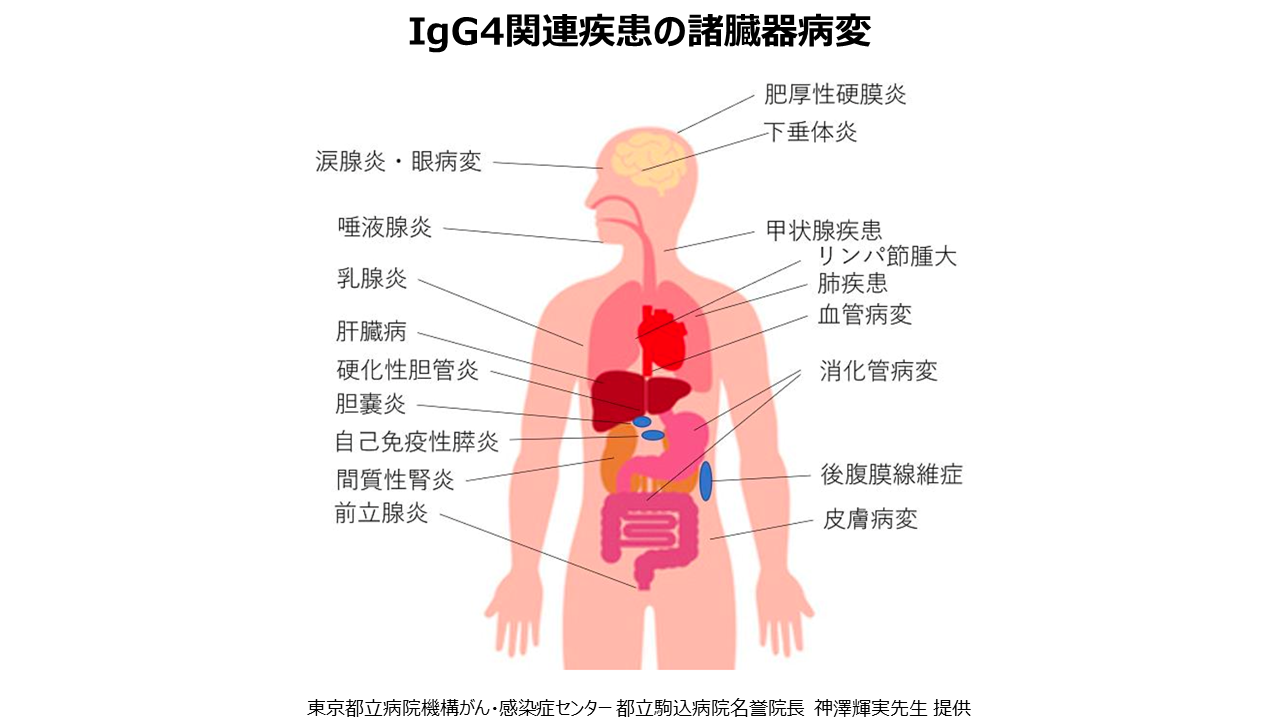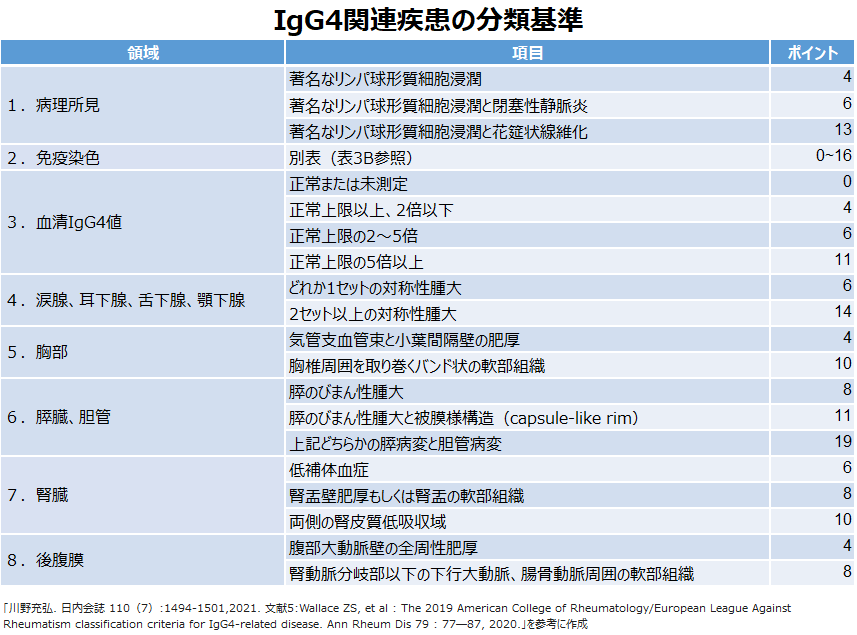ASOURCE®NAVI

公開日:2023.08.18
IgG4関連疾患は、21世紀に日本で発見された新しい全身性の自己免疫疾患です。全身のいろいろな臓器に炎症が起こり、硬いしこりができるのが特徴とされます。がんなど悪性腫瘍と似た症状が出ることもあり、鑑別が重要です。2019年には国際的に統一された診断基準ができるなど、徐々に認知度が高まっています。
IgG4関連疾患は、全身のさまざまな臓器に炎症が起き、痛みや機能低下などの症状が出現することが特徴です。障害が起こる臓器は患者によって異なり、涙腺や唾液腺で起きれば、目の周りや顎に腫れが現れます。肺や腎臓、膵臓などの臓器に発生すると、臓器の機能が低下します。発症患者の平均年齢は約60歳で、日本国内における患者数は数万人と推定されています。また、国の難病にも指定されています。

IgG4関連疾患の診断は、ハーバード大学のジョン・ストーン教授が中心となって2019年に策定された「IgG4関連疾患分類国際基準」に基づいて行われます。この基準では、以下の3つのステップに分けて診断が行われます。
ステップ1エントリー基準:
出現頻度の高い10個の臓器病変(膵臓、唾液腺、胆管、眼窩、腎臓、肺、大動脈、後腹膜、硬膜、甲状腺)の臨床像、画像所見およびリンパ球と形質細胞浸潤の炎症性の病理所見により本疾患を疑います。
ステップ2 除外基準:
臨床像、血液所見、画像所見、病理所見、既知の疾患(潰瘍性大腸炎、クローン病、橋本病など)の5項目からなる除外基準を確認します。除外が認められない場合、ステップ3に進みます。
ステップ3 包括基準:
本疾患を示唆する、(1)組織所見、(2)組織中のIgG4 陽性形質細胞浸潤、(3)血清IgG4 濃度、(4)涙腺、耳下腺、舌下腺、顎下腺病変、(5)胸部病変、(6)膵臓と胆管病変、(7)腎病変、(8)後腹膜病変の8つの領域の所見がスコア化されます。例えば、血清IgG4値が正常上限から正常の2倍までなら4点、2~5倍までなら6点、5倍を超える値なら11点のスコアになります。8項目のスコア合計点が20点以上の場合には、IgG4関連疾患と診断されます。

IgG4関連疾患の一種である自己免疫性膵炎は、膵臓に炎症が起こる病気で、高齢男性に多く発症し、糖尿病の悪化、閉塞性黄疸、膵腫大、膵管や胆管の狭窄などの症状がみられます。自己免疫性膵炎と膵臓がんは、症状が似ているため、鑑別が難しい場合があります。これまでの診断では、膵炎の合併症を起こすリスクのある内視鏡的逆行性膵管造影(ERP)が必須とされてきましたが、磁気共鳴胆管膵管造影(MRCP)や超音波内視鏡下穿刺吸引細胞診(EUS-FNA)の検査の普及により、ERPを行うことなく両者の鑑別が可能となりました。
IgG4関連疾患は、比較的発症頻度の低い疾患のため、本疾患を専門に診療する医師は多くありません。また、複数の臓器にまたがる疾患のため、それぞれの臓器の専門医が組織横断的に治療にあたっていく必要があります。こうした背景から、2023年4月に都立駒込病院が国内で初のIgG4関連疾患を専門的に診療するセンター(センター長:神澤輝実・都立駒込病院名誉院長)を設立しました。センターでは、消化器内科、膠原病科、眼科、耳鼻咽喉科、腎泌尿器科、総合診療科、放射線科、病理科の医師が連携して診療を行います。今後は、他の地域でも、同センターのような各科の医師たちが連携を取る総合的な診療アプローチが必要となってくると思われます。
メディアスグループは、医療機器の販売を中心とした事業を展開しています。医療に携わる私たち(Medical+us)は、医療現場や人々の健康的な明日へ役立つ情報をお届けする情報発信源(Media)の役割も果たしていきたいと考えています。